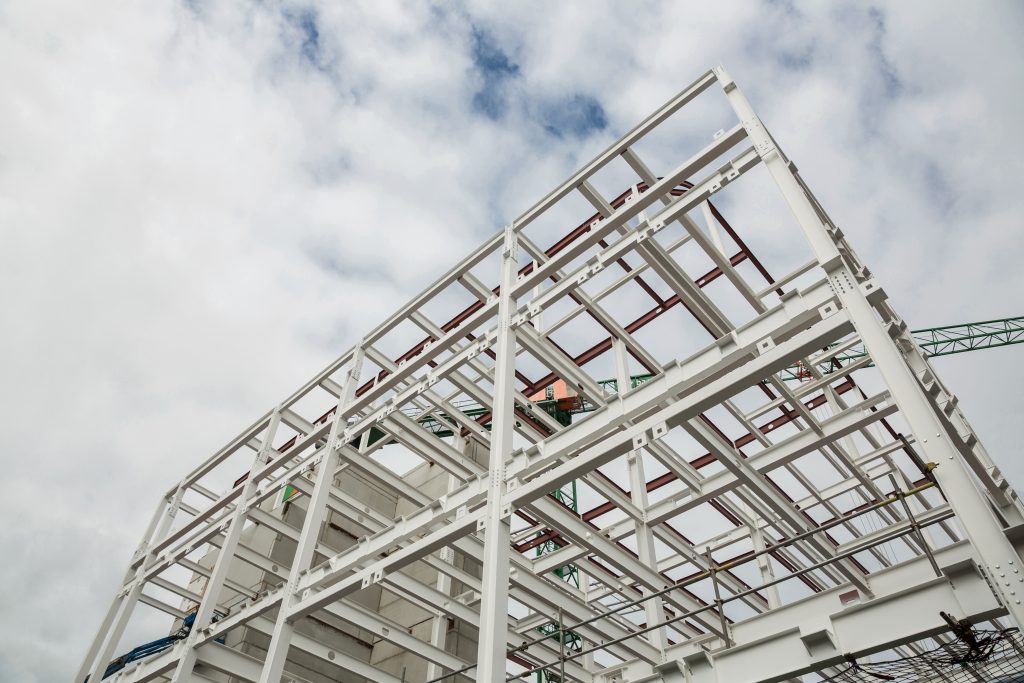Pre-engineered buildings (PEBs) are modern structures built from prefabricated steel frames. They are increasingly popular in Kerala for warehouses, factories, and even residential and commercial projects. Advocates note that PEBs can reduce construction time and costs, but a key question is whether they are eco-friendly. In this article, we examine factors like material efficiency, energy efficiency, and durability to see how PEBs measure up environmentally. We also discuss how local PEB providers and construction company services in Kochi, Aluva, and Thrissur contribute to sustainable building practices in Kerala.
Material Efficiency
One major environmental advantage of PEBs is material efficiency. Since PEB components are precisely engineered in factories, builders use only the necessary amount of steel, which minimizes off-cuts and scrap. For example, modern PEB frameworks are made of high-quality, lightweight steel that can be cut exactly to design specifications, so the construction process generates very little waste. In fact, steel PEB components are typically fully recyclable – one report notes that steel used in PEBs is “100% reusable” and produces far less waste than conventional concrete construction. Key points include:
- Precision fabrication: PEB components are custom-made for each project, ensuring only essential material is used.
- Recyclable steel: Structural steel often contains up to 88% recycled content, and the steel from a building can be completely recycled at end-of-life (Steel frames are among the most recyclable construction materials.)
- Minimal scrap: Compared to brick-and-mortar projects, PEB construction typically creates much less leftover material and demolition debris.
Together, these factors make pre-engineered projects highly resource-efficient. By cutting down on raw material use and maximizing recycled content, PEBs align well with green building principles.
Energy Efficiency
PEBs can also excel in energy efficiency. The design and insulation of steel buildings often reduce heating, cooling, and lighting demands over the building’s life. Key features include:
- High-performance insulation: Many PEB systems use insulated roof and wall panels. These panels provide excellent thermal barriers, cutting down air-conditioning and heating needs. In fact, prefab steel buildings frequently boast “energy-efficient insulation” that lowers their carbon footprint
- Passive design elements: Builders often incorporate skylights, large windows, and ventilation options into PEB designs. These elements maximize natural daylight and airflow, which can dramatically reduce artificial lighting and HVAC usage
- Tight building envelope: Factory fabrication ensures a precise fit between panels and components, minimizing air leaks. This optimized envelope further improves overall energy performance.
As a result, a well-designed PEB can consume significantly less energy in daily operation compared to a poorly insulated traditional building. In Kerala’s humid climate, the ability to naturally ventilate and rapidly cool large spaces is especially beneficial, helping to lower both electricity use and carbon emissions.
Durability
Durability is another area where PEBs offer environmental benefits. A long-lasting building requires fewer repairs and replacements, which conserves resources over time. Steel PEB structures are inherently strong and resilient:
- Resistant to pests and decay: Unlike wood, steel does not rot or attract termites. Steel frames are largely immune to mold and insects, eliminating the need for chemical treatments. They are also fire-resistant, which enhances safety in Kerala’s humid, fire-prone conditions
- Weather resilience: PEBs are engineered to withstand extreme weather. High-grade steel structures can resist heavy rainfall and strong winds common in Kerala’s monsoons. Properly designed PEB frames can endure cyclones and even seismic events, making them well-suited for disaster-prone regions.
- Low maintenance, long life: Coated steel requires minimal upkeep. A properly constructed PEB can easily last 50 years or more with little repair, far exceeding the lifespan of many traditional buildings.
These durability features mean fewer resources spent on renovations or rebuilds. By avoiding repeated repairs, PEBs reduce the material and energy footprint over the building’s lifetime, further supporting sustainability.
PEBs in Kochi, Aluva, and Thrissur
PEBs have become widely adopted across Kerala, especially in urban and industrial areas. Local availability of expertise makes these projects feasible and eco-friendly:
- Pre Engineered Building Manufacturer: Kerala hosts several specialized PEB manufacturing firms. For example, Lee Builders is a leading PEB manufacturer in Kochi and Thrissur. These companies design and fabricate the steel components using efficient, sustainable methods, ensuring high-quality, green buildings for local projects.
- Construction & Contractor Services: Many of the best construction companies in Kochi (and Thrissur) now offer turnkey PEB solutions. Local building contractors in Kochi and building contractors in Thrissur have experience with steel-frame assembly. These firms provide end-to-end construction company services – from structural design and permitting to on-site erection – integrating eco-friendly practices at each step.
- Search & Availability: In Kerala cities like Kochi, Thrissur, and Aluva, looking up “pre engineered building in Kochi”, “pre engineered building in Thrissur”, “pre engineered buildings in Aluva”, or “new building construction near me” often returns local PEB specialists. This reflects strong demand for sustainable steel construction. Local contractors and construction companies in Kochi leverage these keywords to promote PEB projects, making it easy for buyers to find green building solutions nearby.
Overall, the PEB industry in Kerala is well-positioned to support environmentally friendly construction. The combination of local manufacturing and skilled contractors means that clients can build quickly and sustainably.
Conclusion
In summary, pre-engineered buildings can indeed be an environmentally friendly choice for Kerala. They use materials efficiently (with minimal waste and high recyclability), offer energy-efficient designs (through insulation and passive features), and deliver durable, long-lasting structures that resist harsh climate and pests. These advantages make PEBs a smart fit for Kerala’s focus on green infrastructure. For those in Kochi, Aluva, Thrissur and beyond, partnering with a reputable PEB provider or construction contractor means getting a new building that is both high-performance and eco-conscious. In fact, experts note that well-designed PEB projects are often among the best pre engineered buildings in terms of sustainability. By choosing qualified PEB manufacturers and contractors, developers ensure their new construction aligns with Kerala’s environmental goals.





